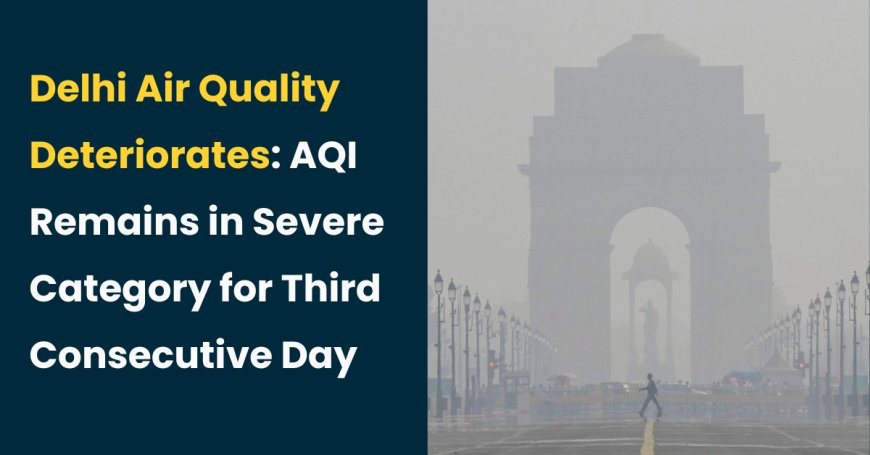Delhi Air Quality Deteriorates: AQI Remains in Severe Category for Third Consecutive Day

New Delhi: The national capital continues to grapple with hazardous air pollution, as the Air Quality Index (AQI) stood at 409 on Friday, placing it firmly in the "severe" category for the third consecutive day. The Central Pollution Control Board (CPCB) reported that smog blanketed the city, disrupting visibility, traffic, and flight operations.
Widespread Severe Pollution Across Delhi
Of the 39 air quality monitoring stations in Delhi, 21 recorded AQI levels in the severe range, with four stations—Jahangirpuri, Bawana, Wazirpur, and Rohini—falling into the 'severe plus' category. These areas reported alarming AQI levels of 458, 455, 455, and 452, respectively.
Although the overall 24-hour AQI of 409 marked a slight improvement from Thursday’s level of 432, it offered little respite from the suffocating air. Factors such as vehicular emissions, crop stubble burning in neighboring states, and unfavorable weather conditions like low wind speeds have compounded the crisis.
GRAP Stage 3 Measures Implemented
In response to the persistent air quality crisis, Stage 3 of the Graded Response Action Plan (GRAP) has been enforced across Delhi-NCR. Following directives from the Commission for Air Quality Management (CAQM), stringent measures aim to mitigate pollution levels:
-
Traffic Restrictions: Interstate buses from NCR states—except electric, CNG, and BS-VI diesel vehicles—are barred from entering Delhi.
-
Construction Ban: All construction and demolition activities are prohibited.
-
Vehicle Limitations: Movement of BS-III petrol and BS-IV diesel vehicles is restricted in Delhi and surrounding districts, including Gurugram, Faridabad, Ghaziabad, and Gautam Budh Nagar.
-
Dust Control: Mining-related activities are suspended, and daily water sprinkling is mandated on major roads to curb dust pollution.
Impact on Education and Public Health
The Delhi government has taken additional steps to protect vulnerable groups. Classes for students up to Grade V have been moved online until further notice, ensuring that young children are not exposed to the toxic air. The shift to remote learning reflects growing concerns about the long-term health impacts of severe pollution.
The Role of EPR Certificate in Combating Pollution
Environmental compliance, such as obtaining an EPR Certificate (Extended Producer Responsibility), has gained prominence in combating pollution. The EPR framework mandates that producers and manufacturers take responsibility for the recycling and disposal of their waste, especially plastic and electronic waste. Strengthening EPR compliance could play a crucial role in addressing Delhi's mounting waste management challenges, which contribute to air pollution during the winter months.
Conclusion
Delhi's air pollution crisis underscores the urgent need for sustainable solutions and stricter enforcement of environmental regulations. While GRAP measures aim to provide immediate relief, long-term strategies, including robust EPR implementation, are essential for achieving lasting improvement in air quality.
With pollution choking the city and affecting millions, it is imperative for authorities, industries, and residents to collaborate in curbing emissions and fostering a cleaner, healthier environment.
